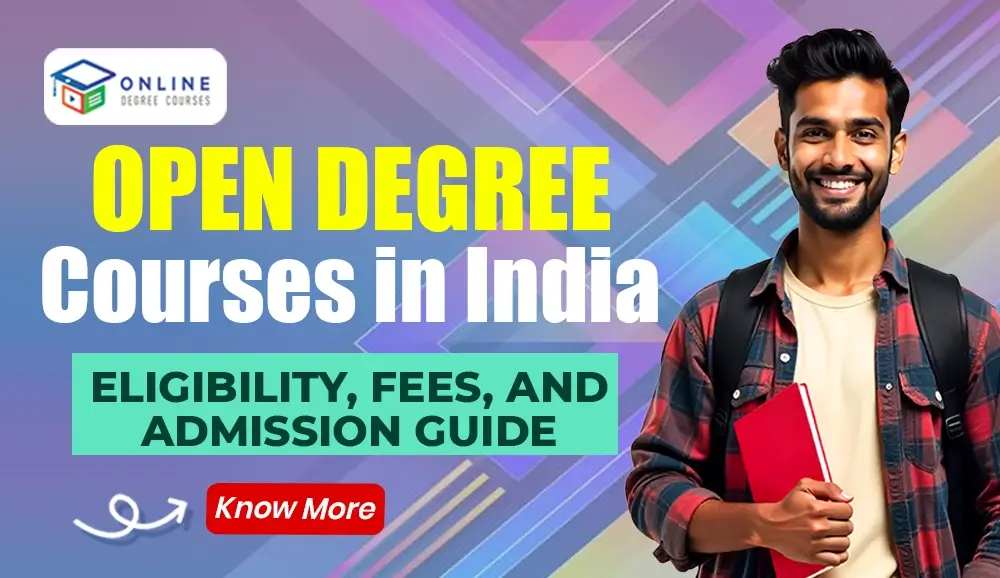Open degree courses in India are changing the way people learn, making education more accessible to everyone. In 2026, these flexible programs are becoming more popular as students look for ways to study at their own pace without being tied to a classroom.
But with so many options, it’s important to understand the eligibility, fees, and admission process. Knowing these details can help you choose the right course and start your learning journey smoothly. Curious about how an open degree can benefit you? Let’s explore!
Table of Contents
What are Open Degree Courses in India?
Open degree courses in India are academic programs offered through distance education, allowing students to earn a degree without attending regular classes. These courses are designed to be flexible, enabling students to study at their own pace and from anywhere, making education accessible to those with busy schedules or limited access to traditional institutions.
Key features of open degrees include flexibility in learning, no age restrictions, and the ability to choose from a wide range of subjects. These programs are ideal for working professionals, stay-at-home parents, or anyone looking for a more adaptable learning option.
The benefits of pursuing an open degree in India include affordable fees, the opportunity to balance work and study, and access to education from recognized universities like IGNOU and LPU. Open degrees also offer a chance for career advancement, as they are widely accepted in the job market, making it easier to pursue higher studies or new job opportunities.
Top Open Degree Courses in India for 2026
In 2026, several open degree courses are highly popular and offer great flexibility for students:
- B.A. (Bachelor of Arts): This undergraduate course covers a wide range of subjects like English, History, Sociology, and Political Science. It’s a versatile degree that can lead to careers in teaching, research, or public service.
- B.Com (Bachelor of Commerce): A popular course for those interested in business, finance, and economics. It opens doors to careers in accounting, finance, and management. The demand for commerce graduates remains strong in 2026.
- BBA (Bachelor of Business Administration): This course is ideal for students interested in business management and entrepreneurship. With a growing number of startups and businesses, a BBA can lead to various managerial roles.
- M.A. (Master of Arts): A postgraduate course that allows specialization in subjects like English, History, Sociology, and Psychology. It is perfect for those aiming for advanced knowledge in the humanities or social sciences.
- M.Com (Master of Commerce): A postgraduate course that deepens knowledge in commerce, accounting, and finance. It is highly relevant for students aiming for careers in financial analysis, banking, or teaching.
- M.Sc. (Master of Science): This course offers specializations in fields like Mathematics, Physics, or Biology. With industries increasingly relying on science and research, an M.Sc. can lead to roles in research, development, or higher education.
Eligibility Criteria for Open Degree Courses in India
General Eligibility Requirements
- Age: There are no age limits for most open degree courses, making them accessible to students of all ages.
- Academic Background: For UG courses, students must have completed their higher secondary education (12th grade) from a recognized board. For PG courses, a relevant bachelor’s degree from a recognized university is required.
Specific Eligibility for UG and PG Courses
- UG Courses: Students must have passed the 12th grade in any stream (Science, Commerce, or Arts) from a recognized board to be eligible for UG open degree courses like B.A., B.Com, and BBA.
- PG Courses: For PG courses like M.A., M.Com, and M.Sc., students need to have a relevant undergraduate degree (e.g., a B.A. for M.A., or a B.Com for M.Com).
Importance of UGC-DEB Recognition
It is crucial to ensure that the open degree course is recognized by the UGC-DEB (University Grants Commission Distance Education Bureau). This recognition ensures that the degree is valid and accepted by employers and other educational institutions. It also guarantees that the course meets the required academic standards and adheres to quality guidelines.
Fees Structure for Open Degree Courses in India
Undergraduate Open Degree Courses
- B.A. (Bachelor of Arts): The total fee ranges from ₹6,000 to ₹14,000 per year, depending on the specialization.
- B.Com (Bachelor of Commerce): Fees vary between ₹4,800 and ₹7,200 annually, influenced by the chosen specialization.
- BBA (Bachelor of Business Administration): The total fee for the entire program is approximately ₹27,000 to ₹60,000, depending on the specialization.
Postgraduate Open Degree Courses
- M.A. (Master of Arts): Fees range from ₹9,600 to ₹18,600 per year, varying with the chosen specialization.
- M.Com (Master of Commerce): The annual fee is between ₹7,800 and ₹10,500.
- M.Sc. (Master of Science): Fees range from ₹15,600 to ₹72,400 annually, depending on the specialization.
Step-by-Step Admission Process for Online Degree Courses
The admission process for open degree courses in India is designed to be simple and accessible. Here’s a brief step-by-step guide:
- Create a DEB ID: Before applying, obtain a Distance Education Bureau (DEB) ID, as it’s mandatory for all Open and Distance Learning (ODL) and online programs.
- Register Online: Visit the official IGNOU admission portal and click on “New Registration.” Provide your email ID and mobile number to create an account.
- Fill Application Form: Log in with your credentials and complete the application form with personal, educational, and program details.
- Upload Documents: Prepare and upload scanned copies of necessary documents, including:
- Passport-sized photograph
- Signature
- Age proof (e.g., birth certificate or 10th-grade mark sheet)
- Educational qualification certificates
- Category certificate (if applicable)
- BPL certificate (if applicable)
- Experience certificate (if any)
- Pay Application Fee: Submit the non-refundable application fee online through debit/credit card, net banking, or UPI. Fees typically range from ₹200 to ₹1,000, depending on the program.
- Submit Application: After reviewing all details, submit the application. You’ll receive an acknowledgment and can track your admission status through the portal.
Accreditation and Recognition of Open Degree Courses
Accreditation is crucial when choosing an open degree course, as it ensures the program meets academic standards and is recognized by employers and other institutions.
- Significance of UGC-DEB Approval: The University Grants Commission (UGC) Distance Education Bureau (DEB) approval guarantees that the open degree course is legitimate and adheres to the required academic standards. This approval makes the degree valid for further education or employment in India and abroad.
- How to Verify the Credibility: To verify the credibility of an open degree program, always check if the university or institution has UGC-DEB recognition. You can visit the UGC-DEB official website to confirm if the institution offering the course is listed.
- Importance of Choosing Accredited Institutions: Choosing accredited institutions ensures that the degree you earn is widely accepted and holds value. Accredited institutions maintain high educational quality and follow ethical guidelines, which can significantly impact your career prospects.
Career Opportunities After Open Degree Courses
After completing an open degree, graduates can explore various career opportunities:
- Job Sectors: Open degree holders can work in sectors like education, business, marketing, finance, and government, with roles such as marketing managers, financial analysts, and teachers.
- Scope for Higher Studies: Graduates can pursue postgraduate courses like M.A., M.Com, or MBA, or opt for professional certifications to boost their career.
- Real-life Examples: Many successful individuals, including business leaders and government officials, have built their careers after earning degrees through open education, proving the value of these programs.
Common Myths and Misconceptions About Open Degree Courses
There are several myths about open degree courses that need clarification:
- Myth 1: Open Degrees Are Low Quality: Many believe that open degrees lack academic rigor. In reality, these programs are accredited by recognized bodies like UGC-DEB, ensuring they meet the same quality standards as traditional degrees.
- Myth 2: Open Degrees Aren’t Recognized by Employers: Some fear open degrees are not accepted in the job market. However, many employers recognize and value these degrees, especially when awarded by accredited institutions like IGNOU or LPU.
- Myth 3: Distance Learning Isn’t Legitimate: There’s a misconception that distance learning is inferior. On the contrary, distance education offers flexibility and is a legitimate, recognized method of earning a degree, provided the institution is UGC-approved.
Top Universities Offering Open Degree Courses in India
Many top universities in India offer open degree courses, providing flexible and accessible education options. Here’s a brief overview of some leading institutions:
Indira Gandhi National Open University (IGNOU)
As the largest open university in India, IGNOU offers a wide range of undergraduate and postgraduate programs across various disciplines. It is known for its affordability and extensive learner support services. The fee structure for programs like B.A. and B.Com is approximately ₹9,000 for a 3-year duration.
Amity University Online
Amity provides UGC-approved online degrees in fields such as MBA, BBA, and M.Com. The university is recognized for its global exposure and has over 300 hiring partners, offering 100% placement assistance.
Lovely Professional University (LPU)
LPU offers a variety of undergraduate and postgraduate programs through distance education. The university is known for its comprehensive curriculum and robust student support system.
Dr. D.Y. Patil Vidyapeeth, Pune
This university offers online programs in areas like Business Management and Computer Applications. It is recognized for its NAAC A++ grade and has partnerships with over 100 hiring companies.
Netaji Subhas Open University (NSOU)
Located in Kolkata, NSOU provides a range of undergraduate and postgraduate programs. It is ranked 2nd among open universities in India and offers affordable courses, with fees ranging from ₹10,000 to ₹30,000.
Uttar Pradesh Rajarshi Tandon Open University (UPRTOU)
Based in Prayagraj, UPRTOU offers a variety of programs and has secured the 3rd position in the NIRF ranking among open universities.
| University | Popular Courses | Fee Range (UG/PG) | Key Features |
| IGNOU | B.A., B.Com, MBA | ₹9,000–₹37,800 | Largest open university, extensive support |
| Amity University Online | MBA, BBA, M.Com | ₹7,458/month | Global exposure, 100% placement |
| LPU | BBA, M.Com, MCA | Varies | Comprehensive curriculum, strong support |
| Dr. D.Y. Patil Vidyapeeth, Pune | MBA, BCA | ₹28,000–₹2,00,000 | NAAC A++, 100+ hiring partners |
| Netaji Subhas Open University | B.A., M.A., M.Com | ₹10,000–₹30,000 | Affordable fees, NIRF 2nd rank |
| UPRTOU | B.A., M.A., B.Com | Varies | NIRF 3rd rank, diverse programs |
Conclusion
Choosing the right open degree course depends on individual preferences, career goals, and financial considerations. Institutions like IGNOU offer affordability and a wide range of programs, making them suitable for students seeking flexibility.
Private universities such as Amity and LPU provide global exposure and robust placement support, appealing to those aiming for international careers. It’s essential to research each university’s offerings, accreditations, and support services to make an informed decision.

